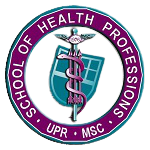The Ophthalmic Technology Program trains ophthalmic technicians theoretically and clinically to carry out technical functions, which this professional will perform under the direction and supervision of the ophthalmologist. Among its functions are to assist the ophthalmologist in the clinical area (diagnosis and treatment), surgical and preventive. Within these functions, perform tasks such as taking a medical history to patients’ execution of different diagnostic tests, both manual and computerized. The Program’s objectives are mainly aimed at developing in the student the competencies required in the field of the profession to face the continuous changes that occur in society with the advent of modern technology in the field. Additionally, prepare trained professionals to work in an interdisciplinary team of visual care in hospital environments at the primary, secondary, and tertiary levels.
Ophthalmic technicians acquire competencies in developing knowledge and skills through the didactic and clinical components. The teaching curriculum integrates anatomical knowledge of the eye, eye procedures, eye diseases, optics, ophthalmic equipment, ocular pharmacology, ethics, psychology, and surgical. The Ophthalmic Technology Program is a full-time program and lasts for one academic year. The academic year is divided into two (2) semesters and one (1) summer. Students are offered didactic courses with laboratories in the courses that require them during the first semester. In the second semester, didactic courses and clinical experiences are offered. A wide variety of supervised clinical experiences are provided in different specialized and subspecialized clinical sites so that they can develop all the competencies of the profession. Rotations also included clinical sites that perform ocular surgical procedures. In addition to academic experience, students are exposed to a variety of community service experiences and extracurricular activities to play an educational and social role.
The Program is accredited by the International Council of Accreditation (ICA). The accreditation is classified as full accreditation without any indication, complying with the highest teaching standards in Ophthalmic Technology. Upon completing the Associate Degree, graduates can apply for the national Certified Ophthalmic Technician (COT) certification exam offered by the International Joint Commission on Allied Health Personnel in Ophthalmology (IJCAHPO). Ophthalmic technicians work in various settings, including the Department of Health, hospitals, private ophthalmic offices, outpatient ocular surgery centers. They provide services in any area of ophthalmological subspecialty.
Admission Requirements
Applicants from any of the units of the University of Puerto Rico System may request transfer within the deadline established by their units’ Registrar’s Office. Students from private universities should submit the application in electronic format (application of admission at http://rcm1.rcm.upr.edu/decanatoestudiantes/oficina-de-admisiones/), within the deadline established by the program (usually in March). For more information about specific deadlines, please contact the Office of Admissions of the Medical Sciences Campus, at 787-758-2525, extension 5211, 5213, 5214.
Applicants for admission to the professional program must comply with the following requirements:
Completion of 33 credits of required courses at an accredited institution in the areas stated below. For specific courses within each subject, please contact the program.
Required Courses
| Courses | Credits |
|---|---|
| English | 6 Semester Credit – Hours |
| Spanish | 6 Semester Credit – Hours |
| Humanities | 6 Semester Credit – Hours |
| Social Sciences | 6 Semester Credit – Hours |
| Biological Sciences | 6 Semester Credit – Hours |
| Mathematics | 3 Semester Credit – Hours |
| Total | 33 Semester Credit – Hours |
- Minimum General Grade Point Average of 2.00.
- Have a Specific Grade Point Average of at least 2.00 in biological sciences and mathematics.
- Biological Sciences and Mathematics courses must be approved with a minimum course grade of “C” or above.
- Fluency in Spanish and knowledge and comprehension of English.
- Minimum interview score of 12.
Course Descriptions
Informative Sheet
English Version: Informative Sheet of the Program
Versión Español: Hoja Informativa del Programa
Study Costs
Graduation Requirements
- Completion of program courses and clinical practice.
- Minimum grade point average of 2.00.
- Theoretical courses must be approved with C or higher and clinical practice with B.
Graduate Rate (2022-2025)
Employment Rate (2022-2025)
Accreditation Information
International Council of Accreditation (ICA)
2025 Woodlane Dr.
St. Paul, MN 55125
United States of America
Phone: 651-731- 7243, Fax: 651-731- 0410, International: +1 651-731- 7243
http://icaccreditation.org/
Program Faculty
- Alex J. Soto Vega, DHSc, COT
Program Director
- Ramón R. Berríos Pérez, MD.
Medical Director
- Elina M. Caballero Colón, COT, OSC.
Associate Professor / Clinical Coordinator
Physical Address
School of Health Professions, 7th Floor, Office 725
Medical Center Complex
Monacillo Area, Río Piedras, Puerto Rico
Po Box 365067
San Juan, PR. 00936-5067
Contact
Tel: 787-758-2525 Ext. 4603 & 1935
Program Email:
tecnologiaoftalmica.rcm@upr.edu
Program Fax: 787-751-0636
